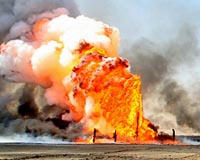 |
Baghdad (UPI) Jul 1, 2009 The Iraqi government's much-touted award of major production contracts for international oil majors on June 29-30 turned out to be a big fizzle. There was barely any bidding for the six oil fields and two gas fields the Iraqis planned to open up for badly needed development. These contain some 43 billion of Iraq's 115 billion barrels of oil reserves. Only one contract was actually awarded to selected bidders, most of them oil majors forced out of Iraq when Saddam Hussein nationalized the oil industry in 1972. The expected stampede by Big Oil to get back into the country with the third-largest oil reserves after Saudi Arabia and Iran -- and possibly the biggest reserves once untapped deposits are properly explored -- never happened. And neither did the deluge of dollars Baghdad was looking for to revitalize its aging, war-battered, sanctions-crippled and ineptly managed oil industry. The government estimates it needs $50 billion to do that, on top of the $8 billion it has spent since Saddam was toppled in the U.S.-led invasion of March 2003. Oil Minister Hussain al-Shahristani, who's already widely criticized for not getting the oil industry back on its feet, said the bidding by a BP-led consortium, ConocoPhillips, the China National Petroleum Corp. and others was far below the government's minimum. The main reason for the lack of action seems to have been that the foreign companies considered Iraq's terms for the 20-year contracts to be inadequate -- not enough to compensate for the security risks and political uncertainty. The auction was supposed to be a milestone in Iraq's postwar economic recovery. It looked more like a millstone. In particular, the companies were dismayed at the government's inability to formulate an oil law that would govern the industry, largely because of the rivalry between competing political blocs that want a share of Iraq's energy wealth. But Baghdad still desperately needs that foreign investment if it is to crank up the oil exports on which it depends for 90 percent of its revenues. Bottom line: It looks pretty much like that for the time being, at least, Big Oil has Baghdad over a barrel. "These oil companies want to make as much money as they can, so they submitted low bids," Shahristani told a post-auction news conference. "But I sent them a message that there are people in Iraq who are protecting Iraq's wealth." The only bid awarded during the daylong televised auction in the Rasheed Hotel in Baghdad's heavily guarded Green Zone went to the BP consortium. That was for the big Rumaila field in the oil-rich south. This was the biggest prize, with reserves estimated at 17.8 billion barrels. But it could hold much more. BP and its Chinese partner had demanded $3.99 for every barrel it produced above a guaranteed minimum production level. Exxon had wanted $4.80. The government refused to go above $2 per barrel, and BP accepted that. No bids at all were offered for the Mansouria oil field in western Diyala province, an insurgent hotbed. If the government of Prime Minister Nouri al-Maliki wants Big Oil's money to bankroll an oil-based postwar recovery, it's going to have to up the ante before foreign companies are going to risk investing billions of dollars in a country the American military is leaving, heightening the prospect of renewed sectarian bloodletting. Failure to restore and develop the oil and gas industry will only intensify internal friction, so unless compromise reached, and soon, the prospect of stability will quickly fade. It's not clear yet whether the government is prepared to increase its offer or if it plans another auction. But Tuesday's event -- delayed by a sandstorm -- vividly demonstrated the great gap between the expectations of the government and the oilmen. That was most pronounced in the bidding for the Missan block of three adjacent northern fields for which China's National Offshore Oil Corp. demanded payment of $21.40 per barrel over the baseline production level. The government would not budge from its standard $2 per barrel. Iraq currently produces around 2.4 million barrels of oil per day. Shahristani, a former nuclear scientist imprisoned by Saddam because he refused to work on the Iraqi tyrant's bomb program, wants to boost that to 4 million in five years. That's about the level before the 1990-91 war in the Gulf -- and a prospect that seems little closer after the Baghdad auction than it did before.
Share This Article With Planet Earth
Related Links Powering The World in the 21st Century at Energy-Daily.com
 Britain's BP, Chinese oil firm win Iraq deals
Britain's BP, Chinese oil firm win Iraq dealsBaghdad (AFP) June 30, 2009 British energy giant BP and China's CNPC International Ltd were unveiled Tuesday as the first foreign firms in decades to win contracts to invest and develop in Iraq's war-battered energy sector. The companies succeeded in their bid for the giant Rumaila oil field in southern Iraq, which has known reserves of 17.7 billion barrels, the oil ministry announced. The contract was the first to ... read more |
|
| The content herein, unless otherwise known to be public domain, are Copyright 1995-2009 - SpaceDaily. AFP and UPI Wire Stories are copyright Agence France-Presse and United Press International. ESA Portal Reports are copyright European Space Agency. All NASA sourced material is public domain. Additional copyrights may apply in whole or part to other bona fide parties. Advertising does not imply endorsement,agreement or approval of any opinions, statements or information provided by SpaceDaily on any Web page published or hosted by SpaceDaily. Privacy Statement |